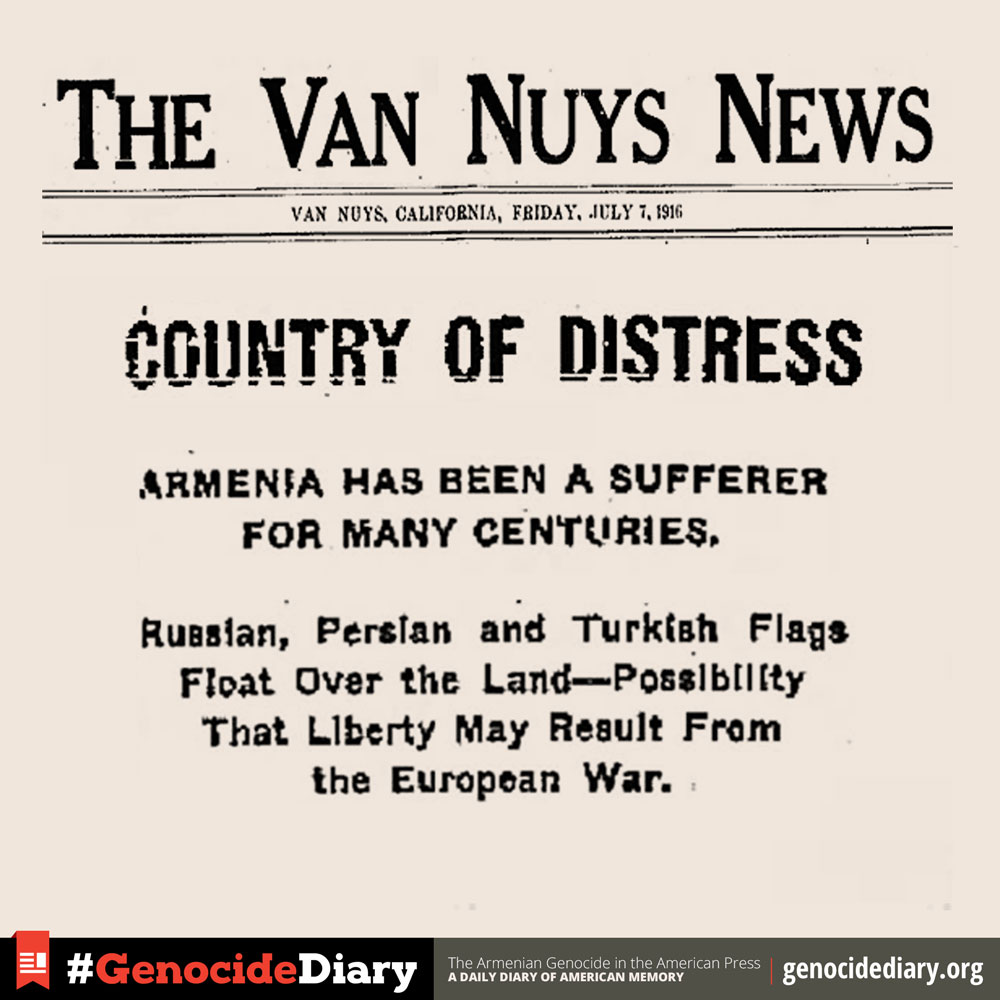Country of Distress
- DATE 7 Jul , 1916
- POSTED IN California, United States
“Armenia Has Been a Sufferer for Many Centuries”
“Russian, Persian and Turkish Flags Float Over the Land–Possibility That Liberty May Result From the European War.”
The lesser nations have come into prominence during the war because of the efforts of patriotic committees to revive ancient governments. The balkan states and poland and Lithuania are examples: Of late there have been numerous reports of distress in Armenia, due to the conflict of Russian and Turkish arms. Months ago voices were raised in England on its behalf when it was seen that Russia, England and France were to be banded together against the Germanic-Turkish powers. Now comes the demand that the aspirations of Armenia be recognized, that the Christian people who for generations have suffered persecution be permitted to order their own affairs, and to take up the self-government which they lost many years ago.
Armenia, like Poland, lies today in three parts. A portion is under the Russian flag and a portion nominally under Persia. But the greater part is in subjection to Turkey. In Russian Armenia there are about a million nationals; in Persia, 150,000, and in Turkish Armenia, 1,500,000. Religion, caste and business, with the influence of international politics, have been the causes of much misery. The Christian faiths are split. There are Gregorians, Roman Catholics and Protestants. The lot of all Christian Armenians–and this includes the vast majority–has been espeically hard in Turkish Armenia, where there are 4,500,000 Moslems. Armenia lies south of the Caucasus and the Black sea. Anciently it was a kingdom, enjoying a high degree of culture many centuries before the Christian era. Later it was under the dominion of the Medes and Persians. The Hebrews, in their wanderings, came into contact with the Armenians, in the mightiest days of the Roman empire, Armenia experienced at first subjection and then a degree of protection to which its later lot stood in grim contrast.
Early in the sixteenth century Armenia’s partition became definite. That period marked the military rise of the Moslem. From the introduction of Christianity the conflict between Musulmans and Christians was assured, and was the forerunner of the dreadful massacres of the nineties. To modern “Armenian question” appeared after the signing of the treaty of San Stefano, which was to the Armenians less than a “scrap of paper.” Turkish assurances of reforms, as given to the powers, were never carried out. Persecutions increased. Russia was only little better than Turkey. The vicious elements of the Moslem population were stirred purposely, it seemed, and the massacres of recent history followed. France undertook the protection of Roman Catholics, and Russia attempted a like service for Greek Catholics, and the fury of the mob feil on the Protestant and Gregorians, Great Britain and the United States, the latter to a less extent, interested themselves, but the apathy of the European powers in general prevented immediate reform. Armenian massacres have continued, and up to the time the present war began revolutionary movements were developed for relief from Turkey. The time is especially favorable or the prosecution of Armenian claims.


